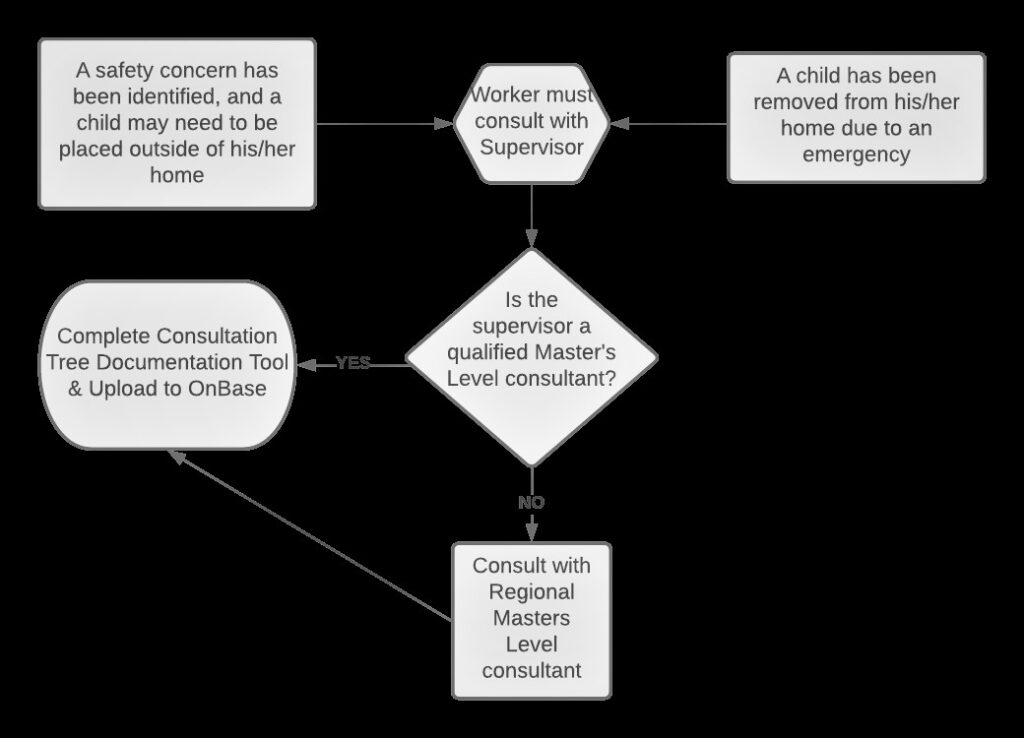(Effective: 08/02/2021)
6.4 Master’s Level Consultation

Prior to making a referral for removal to the juvenile officer by submitting a CD-235 or entering into a Temporary Alternative Placement Agreement (TAPA), or as soon as possible thereafter but no later than seventy-two (72) hours, staff must consult with a professional with two years of experience in child welfare and an advanced degree in social work, or another comparable clinical human services profession. Staff may be a qualified consultant if they have two years of child welfare experience and hold a Master’s Degree or higher in one of the following areas:
- Social Work;
- Psychology;
- Sociology;
- Psychiatric Nursing;
- Education;
- Counseling;
- Marriage and Family Therapy;
- Family and Child Development;
- Criminal Justice;
- Juvenile Justice; or
- Human Services related fields (e.g., child welfare, mental health, substance abuse, and developmental disabilities).
Regional Director approval is required for staff to be a Master’s level qualified consultant when they hold a Master’s Degree or higher in a comparable clinical human services profession not listed above and have two years of child welfare experience.
Staff will continue to consult with their immediate supervisor, regardless of the degree and experience held by the supervisor prior to completing a Master’s level consultation.
Refer to Section 2, Chapter 6 (Referrals to the Juvenile Court), Subsection 1 –for further information on Referrals to the Juvenile Court and Section 1, Chapter 9 (Safety Planning) for additional information on TAPA.
The Master’s level consultation may be done in conjunction with the chief investigator 72 hour case consultation protocols. Follow Child Welfare Manual – Section 2– 5.2.13 Chief Investigator Duties for procedures on chief investigator 72 hour case consultations.
6.4. 1 Master’s Level Consultant’s Role
The consultant’s role is to be involved in the decision making process and to make a recommendation regarding the removal of the child from the home or entering into a TAPA. The purpose of the consultation is to help ensure all factors on which a major case decision have been carefully considered.
Staff who hold a Master’s degree may not serve as a qualified consultant on their own case in order to ensure all case decisions are impartial.
6.4.2 Regional Master’s Level Consultation Tree
Staff may contact any qualified Master’s level consultant within their circuit when consultation is needed and are encouraged to utilize the qualified consultants for their circuit before contacting the qualified consultants for the region.
A regional team of Master level consultants are available to staff when a Master’s level consult is required for a referral to the juvenile court or TAPA. All regions have identified qualified personnel and guidelines for the Master’s level consults. The qualified consultant will review the situation and makes a recommendation. Regions may reach out to state level field support teams if there is a need for additional qualified consultants in the regions.
6.4.3 Documenting a Master’s Level Consultation
A Master’s Level Consultation does not need to be in person and can take place over the phone. The qualified consultant’s recommendations must be documented in the case record by utilizing the Consultation Tree Documentation Tool (CD-299).
The qualified consultant will complete the Mater’s Level Consultation Documentation Tool (CD-299) at the time of the consultation, and provide the tool to the worker and/or supervisor for placement in the electronic case record. The Master’s Level Consultation Documentation Tool (CD-299) must be uploaded into the case file through OnBase.
In addition to the Consultation Tree Documentation Tool being uploaded in FACES on all Master level consultations staff will also document the consultation decision in FACES by:
-
- Using the check box on the Alternative Care Placement screen in FACES for Referrals to the Juvenile Court; and
- Completing the yes/no question about the Master’s level consultation on the Diversion/TAPA screen in FACES when entering into a TAPA.
